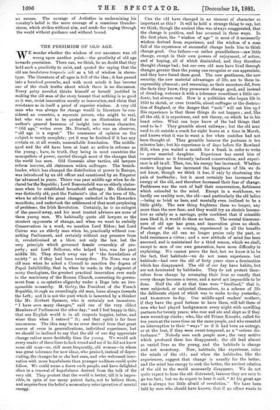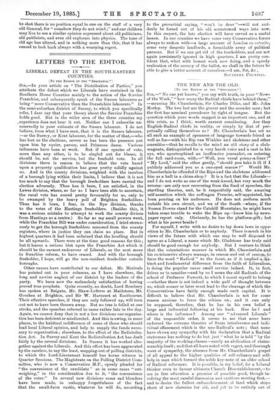THE PESSIMISM OF OLD AGE.
WE wonder whether the wisdom of our ancestors was all wrong upon another point,—the proclivity of old age towards pessimism. There can, we think, be no doubt that they held such a proclivity to exist, and quoted the saying that the old are laudatores temporie acti as a bit of wisdom in stereo- type. The literature of all ages is full of the idea ; it has passed into a hundred proverbs, and with most minds it has become one of thb stock truths about which there is no discussion. Every, petty novelist thinks himself or herself justified in making the old man of the story lamept that nothing is as good as it was, resist innovation merely as innovation, and claim that resistance as in itself a proof of superior wisdom. A very old man who was always for change would in literature be con- sidered an eccentric, a separate person, who might be real, but who was not to be quoted as an illustration of the author's general keenness of insight into human character. " Old age," writes even Mr. Disraeli, who was an observer, "old age is a regret." The consensus of opinion on the subject is nearly complete; yet it may be doubted if it has any certain or, at all events, unassailable foundation. The middle- aged and the old have been at least as active in reforms as the young ; have, in truth, they being in most countries the monopolists of power, carried through most of the changes that the world has seen. Old Generals alter tactics, old lawyers reform tenures, old statesmen widen suffrages. The breech- loader, which has changed the distribution of power in Europe, was introduced by an old officer and sanctioned by an Emperor far advanced in years. Thiers was past middle age when be de- clared for the Republic ; Lord Beaconsfield was an elderly states- man when he established household suffrage ; Mr. Gladstone was distinctly old, past the Psalmist's idea of the term of life, when he advised the great changes embodied in the Hawarden manifesto, and undertook the settlement of that most perplexing of problems, the Irish Revolution. Certainly, he is no eulogist of the passed•away, and his most trusted advisers are none of them young men. We habitually quote old lawyers as the stoutest opponents of change, and when we want to embddy Conservatism in a word, we mention Lord Eldon ; but Lord Cairns was an elderly man when he, practically without con- sulting Parliament, and certainly without any pressure from it, revolutionised at a blow, not only the law, but the very principle which governed female ownership of pro- perty; and Lord Selborne, who helped him, was far past middle life. They struck away one of " the foundations of society" as if they had been twenty-five. Pio Nono was an old man when he asked a Council to sanction the dogma of Papal Infallibility, that is, when he made, in the judgment of many theologians, the greatest practical innovation ever made in the machinery of the Roman Church, converting its govern- ment from a co•optative oligarchy under a Doge into an irre- sponsible monarchy. M. Grevy, the President of the French Republic, though an exceedingly old man, leans always towards the Left; and it is not the past which is lamented by a thinker like Mr. Herbert Spencer, who is certainly not immature. " I have seen many changes," said one of the very oldest Members of Parliament the other day, " and I feel happy in this, that our English world is in all respects happier, better, and wiser than when I entered" it ; and that spirit is far from uncommon. The idea may be an error derived from that great source of error in generalisations, individual experience, but we should be inclined to say that the old of our day appreciate change rather more decidedly than the young. We would ask every reader of these lines to look round and see if he did not know some old man—or, still more frequently, old woman—in whom was great tolerance for new ideas, who praised, instead of depre- ciating, the changes he or she had seen, and who welcomed inno- vation with more hopefulness than younger auditors could quite follow. We could name a dozen such people, and have delighted often in a renewal of hopefulness derived from the talk of the very old. They protest that the world is better, till it is impos- sible, in spite of too many patent facts, not to believe them, and acquire from the belief a momentary reinvigoration of mental energy. Can the old have changed in an element of character so important as this P It will be held a strange thing to say, but we think, though the ancient idea was always exaggerated, that the change is positive, and has occurred in three ways. In the first place, the " wisdom of age" is most of it necessarily wisdom derived from experience, and the wisdom of a man full of the experience of successful change leads him to think change good. Our fathers—or rather grandfathers—saw little change, except in their own powers of enjoyment, of action, and of hoping, all of which diminished, and they therefore thought change bad ; but our own old men have lived through changes greater than the young can recognise or can appreciate, and they have found them good. The new gentleness, the new security, the new material advantages of life, are to them in- expressibly pleasant; and reasoning, as their ancestors did, from the facts they knew, they pronounce change good, and instead of dreading, welcome it with a tolerance sometimes a little sar- donic, but always real. How is a politician who began life in 1830 to shriek, or even tremble, about suffrages or the destruc- tion of England, or the danger that "mob" will eat him up P His experience is that those things do not happen ; and, like all the old, it is experience, and not theory, on which he in his heart relies. What can boys know of the bad things that used to be P They grumble about railways ; but the old man used to sit outside a coach for eight hours at a time in March, and knows what it was to want a fire when matches had not been thought of. They grumble because the postman ie ten minutes late ; but his experience is of days before Sir Rowland Hill, when you waited a month for a frank in order to write to your married daughter. Experience has cured him of conservatism as it formerly induced conservatism, and experi- ence is all in all. Then, too, his energy has increased. Whether modern hygiene has increased the happiness of life we do not know, though we think it has, if only by shortening the pain of toothache ; but it most certainly has increased the energy of the old, and therefore decreased their fear of change. Feebleness was the root of half their conservatism, feebleness which extended to the mind. Except in a workhouse, we hardly see senility now, the old—and particularly the old ladies —being as brisk as bees, and mentally even inclined to be a little giddy. The new thing frightens them no longer, any more than the new face; and they would try an electric locomo- tive as calmly as a carriage, quite confident that if scientific men liked it, it would do them no harm. The mental timorous- ness of old age has gone, and innovation gives no shock. Fearless of what is coming, experienced in all the benefits of change, the old can no longer praise only the past, or hold resistance a virtue; and a new attitude of mind has been assumed, and is maintained for a third reason, which we shall, except to men of our own generation, have more difficulty in explaining. We cannot prove the fact, but we know it to be the fact, that habitude—we do not mean experience. but habitude—had over the old of forty years since a domination which has disappeared. The old of our day, have habits, but are not dominated by habitudes. They do not protect them- selves from change by arranging their lives so exactly that every change becomes a terror, and a novel act impossible to be done. Half the old at that time were " fossilised," that is, were subjected, or subjected themselves, to a scheme of life the deliberate object of which was to make to-day yesterday, and to-morrow to-day. Our middle-aged readers' mothers, if they have the good fortune to have them, will tell them of men who had played backgammon every night with unwilling partners for twenty years; who rose and ate and slept as if they were wound-up clocks ; who, like old Prince Kaunitz, called for ten years at the same time on the same people, and who resented an interruption to-their " ways" as if it had been an outrage, or at the best, if they were sweet-tempered, as a " serious dis- turbance." Nobody sees such people now ; the very motive which produced them has disappeared; the old lead almost as varied lives as the young, and the habitude is change and not monotony. Now, habitude, like experience, rules the minds of the old; and when the habitudes, like the experiences, suggest that change is usually for the better, and the mind has energy to seek the better, the ancient relation. of the old to the world necessarily disappears. We do not quite expect to hear the old distrusted, because they are sure to go too fast ; but we do expect to hear it said, "At his great age one is always too little afraid of revolution." We have been told by men who should have known, that if an officer wants to
be shot there is no position equal to one on the staff of a very old General, for " somehow they do not mind ;" and our children may live to see a similar opinion expressed about old politicians, old publicists, and even old explorers into physics. The tone of old age has altered, and in nothing more than this, that it has ceased to look back always with a wearying regret.











































 Previous page
Previous page